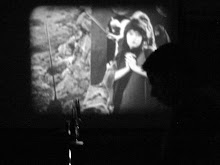In the days leading up to Appu Raja I watched two other favorites of mine from the 1990s, Andaz Apna Apna and Hum Hain Rahi Pyaar Ke. With the two films starring Amir Khan, I felt mortified with my taste in story-telling. I redeemed myself a little with Appu Raja.
Appu Raja is unquestionably a formula film. Honest cop is killed by gangsters, his wife gives birth to twins, twins are separated, crime must lead to punishment (at least in movies, with the exception of Farhan Akhtar's Don) implying revenge must be plotted. This is probably how Panju Arunachalam must have started writing ......... then he got smarter than a fifth grader. Kamal Haasan is credited with the screenplay, so he deserves plaudits as well. On a familiar skeleton is a film fleshed so full of marinated meat, mmmmm ......., that it's now cherished, despite its trite basic story.
The choice of a Kamal Haasan with stunted growth must have been fresh at the time. It took so much effort that a feat like this hasn't been repeated. The film tries to look into the feeling of being a dwarf. He can't get a girl because of his short stature, even his own mother feels so. Even Animal in Indra Sinha's Animal's People has similar problems. On hearing the story of his father's demise and and his mother being poisoned he sets on a killing spree. But the reason for revenge is just as much personal, for his stunted growth, unlike the usual revenge saga where the hero avenges a wife's murder or the slaughter of father he has never met, who later turn out alive.
Secondly, it shows us a circus. This is one reason why I read novels and watch movies, I want to know how it feels to be in a new place and this film at least has a go at it. Appu is given friends unlike heros in other films, Suraj the parrot, Jimmy the tiger, Arjun and Saraswati the pomerians, who later help plot his revenge. After all, why risk other humans when animals are not culpable by law. Every murder by Appu involves resources and trickery from a circus. Isn't this better than going on a bullet-spraying rampage?
I already said this is a formula film. Since the story has already been told before, to see what's new in such films we must look for stories it chooses not to tell. Let's see:
- In the version I watched, believe it's the full version of 150 minutes, there is no scene of Appu being briefed by his mother on a possibly twin.
- There is no scene of tearful union of Appu and Raja or one of tearful union of Raja and his biological mother.
- There is no confrontational scene between Gowthami and her evil father. Even Sidharth finds it necessary to confront his father, Anumpan Kher, in Rang De Basanti.
- Another scene is when the circus master is being convinced by a mob to adopt a Christian son-in-law; this is always the in-focus story in a movie. Here, it is Appu's regret of being short statured that plays out in front of the frame while the issue of inter-religious marriage is easily solved in the background.
I am not even going to discuss the ingenious ways Appu uses to get at the wrongdoers. In the spirit of the film, it is a story I choose not to tell.
RATING: 5/5
PS: The film opens with the gory killing of inspector Raghupati. Reminded me of the climax of Scorsese's Taxi Driver.
PPS: If you think you are having fun watching Amar vs. Prem in Andaz Apna Apna, then please check other works of Singeetham Srinivas Rao and Kamal Haasan: Michael Madhana Kamarajan, Pushpak, Maglir Mattum, even his recent Mumbai Express is zanier.
